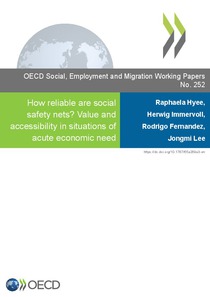How reliable are social safety nets? Value and accessibility in situations of acute economic need

Hyee, Raphaela ; Immervoll, Herwig ; Fernandez, Rodrigo ; Lee, Jongmi
Organisation for Economic Co-operation and Development, Paris
OECD Publishing - Paris
2020
40 p.
social protection ; poverty ; guaranteed income ; social assistance
OECD Social, Employment and Migration Working Papers
252
Social protection
https://doi.org/10.1787/65a269a3-en
English
Bibliogr.
"Social protection systems use a range of entitlement criteria. First-tier support typically requires contributions or past employment in many countries, while safety net benefits are granted on the basis of need. In a context of volatile and uncertain labour markets, careful and continuous monitoring of the effectiveness of income support is a key input into an evidence-based policy process. This paper proposes a novel empirical method for monitoring the accessibility and levels of safety net benefits. It focusses on minimum-income benefits (MIB) and other non-contributory transfers and relies on data on the amounts of cash support that individuals in need receive in practice. Results show that accessibility and benefit levels differ enormously across countries – for instance, in 2015/16, more than four out of five low-income workless one-person households received MIB in Australia, France and the United Kingdom, compared to only one in five in Greece, Italy and Korea, three countries that have since sought to strengthen aspects of safety-net provisions."
Digital
The ETUI is co-funded by the European Union. Views and opinions expressed are however those of the author(s) only and do not necessarily reflect those of the European Union or the ETUI.